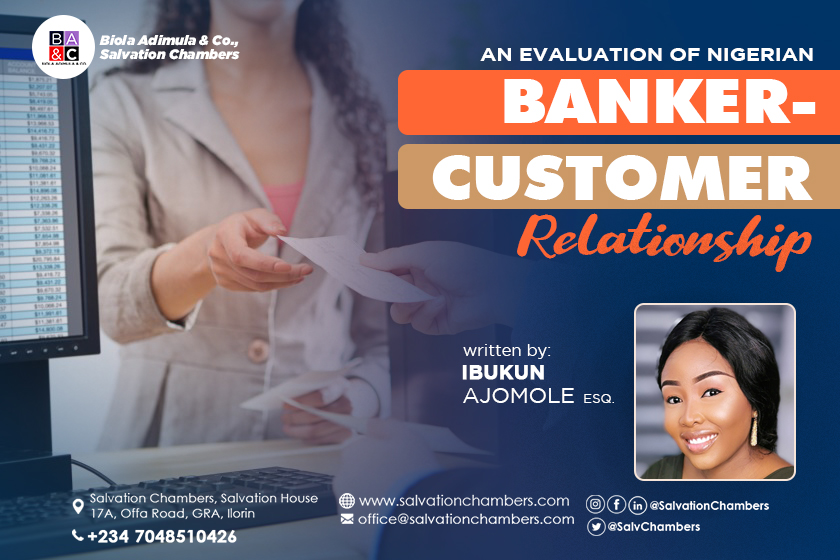Introduction
The words ‘banker’ and ‘bank’ are frequently used interchangeably. Banker may be defined as an incorporated body carrying on the business of receiving deposits on current account, savings account or other similar account; paying or collecting cheques that are drawn by or paid in by customer; provision of finance; or such other business as the Governor may, by order published in the Federal Gazette and designate as banking business. Banks are primarily engaged in the business of banking as their core function.
A customer is any person having an account with a bank or for whom a bank has agreed to collect items and this includes a bank having an account with another bank.
THE BANKER-CUSTOMER RELATIONSHIP
The relationship subsisting between banker and customer is basically contractual and fundamentally that of Debtor and Creditor. It also consists of general and special contracts arising from the particular requirements of the banking business. As such, the relationship existing between banker and customer cannot be exhausted. Therefore, the services rendered or products sold by bank to its customer would always determine what relationship subsists between Bankers and Customers at any point in time.
These relationships include but not limited to;
- Relationship of Debtor and Creditor: When a customer opens an account with a bank and if the account has a credit balance, then the relationship is that of debtor (banker/bank) and creditor (Customer.) The customer has the right to demand back his money whenever he wants it from the banker and the banker must repay the balance to the customer. A customer remains a creditor only when there is credit balance in his account with the banker. The creditor (the customer) must demand payment as the debtor (banker) will not repay the debt on his own. However, in case of fixed deposits, the bank must inform a customer about maturity. The creditor must demand for the payment at the right time, place and in a proper manner. The demand must be in form of cheques, withdrawal slips, or pay order. Now-a-days, banks allow e-banking, ATM, mobile-banking, etc. In case of loan/advance accounts, the banker is the creditor, and the customer is the debtor because the customer owes money to the banker. The banker can demand the repayment of the loan/advance on the due date and the customer has to repay the debt.
- Relationship of Pledger and Pledgee: This happens when the customer pledges (promises) certain assets or security with the bank in order to get a loan. In this case, the customer becomes the Pledger, and the bank becomes the Pledgee. Under this agreement, the assets or security will remain with the bank until a customer repays the loan.
- Relationship of Licensor and Licensee: This happens when the banker gives a sale deposit locker to the customer. So, the banker will become the Licensor, and the customer will become the Licensee.
- Relationship of Bailor and Bailee: Bailment is a contract for delivering goods by one party to another to be held in trust for a specific period and returned when the purpose is ended. Bailor is the party that delivers property to another and Bailee is the party to whom the property is delivered. So, when a customer gives a sealed box to the bank for a safe keeping, the customer becomes the bailor and the bank, the bailee.
- Relationship of Trustee and Beneficiary: A trustee holds property for the beneficiary, and the profit earned from this property belongs to the beneficiary. If the customer deposits securities or valuables with the banker for safe custody, the banker becomes a trustee of his customer. The customer is the beneficiary; the ownership, however, remains with the customer.
- Relationship of Principal and Agent: The banker acts as an agent of the customer (principal) by providing the following agency services:
- Buying and selling securities on his behalf.
- Collection of cheques, dividends, bills or promissory notes on his behalf.
- Acting as a trustee, attorney, executor, correspondent or representative of a customer.
- The banker as an agent performs many other functions such as payment of insurance premium, electricity and gas bills, handling tax problems, etc.
- Relationship of Advisor and Client: When a customer invests in securities, the banker acts as an advisor. The advice can be given officially or unofficially. While giving advice the banker has to take maximum care and caution. Here, the banker is an Advisor, and the customer is a Client.
- Obligation to honour cheques: As long as there is sufficient balance in the account of the customer, the banker must honour all his cheques. The cheques must be complete and in proper order. They must be presented within six months from the date of issue. However, the banker can refuse to honour cheques where they reasonably suspect fraud or the account has been frozen by relevant authorities.
- Secrecy of customer’s account: When a customer opens an account in a bank, the banker must not give information about the customer’s account to others. Exceptions to the duty of secrecy are; where the bank has to give evidence in legal proceedings, where disclosure is made with express or implied consent of the customer, where the bank is suing for an overdraft and where there is duty to the public to disclose.
- Banker’s right to claim incidental charges: A banker has a right to charge a commission, interest or other charges for the various services given by him to the customer. For example, an overdraft facility.
PROBLEMS ASSOCIATED WITH THE BANKER AND CUSTOMER RELATIONSHIP
The aim of any manager of a bank is to satisfy the need and desires of his customers. The customer relative’s desk is the heart beat of any banking operations. Though efforts have been made towards achieving a good relationship between Bankers and Customers, it has however not been easy due to the following problems;
- Poor attitude to work by bank staff.
- Frauds perpetrating by both bank staff and customers.
- Inadequate modern equipment; such as computer.
- The problem of distress in the industry.
- Poor communication services, unreliable power supply and telecommunication system.
- Lack of adequate training on the part of the staff.
- Lack of education and experienced staff.
TERMINATION OF THE BANKER/CUSTOMER RELATIONSHIP
The Banker and Customer relationship terminates when any of these occurs:
- Termination by the Customer
- Termination by the bank
- Termination by Law:
- Death of the customer;
- Mental incapacity of the customer
- Bankruptcy or insolvency of the bank or customer.
.
BENEFITS OF GOOD BANKER/CUSTOMER RELATIONSHIP
There are significant benefits Banks and Customers can derive from good relationships with each other. These include:
BENEFITS TO BANKS
- Effective and efficient operation
- Increase customer satisfaction
- Growth in number of customers
- Maximization of opportunities (i.e. increased services, referrals)
- Increase access to a source of market competitor information.
- Highlighting poor operational processes.
- Long-term profitability and sustainability
BENEFITS TO CUSTOMERS
- Risk and stress reduction
- High-quality service
CONCLUSION
The Nigerian banking industry must understand the importance of Customer Relationship Management in improving the organizational performance of the banks. Banks should focus on increasing their employee’s knowledge-ability and improving their attitude to ensure higher levels of customer relationship management. Effective discharge of Customers and Bankers various rights as well as duties they are both bound with, would go a long way to aid their relationship. Also, Banks should ensure safety of e-banking transactions thereby protecting and safeguarding the interest of customers.
References
1. Banker and customer relationship in Nigeria banking industry by Modish (online) August 20, 2019 Www.modishproject.com/banker-and-customer-relationship-in-nigeria-banking-industry
2. Www.grossarchive.com/project/592/an-evaluation-of-bank-and-customer-relationship-in-nigeria-banking-service
Written By: IBUKUN AJOMOLE ESQ.

